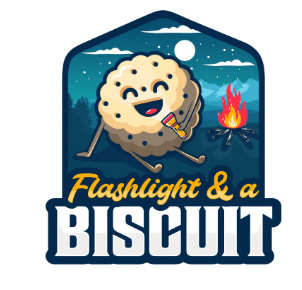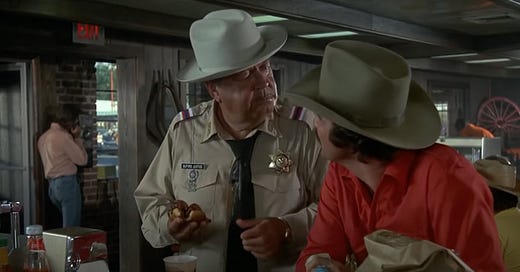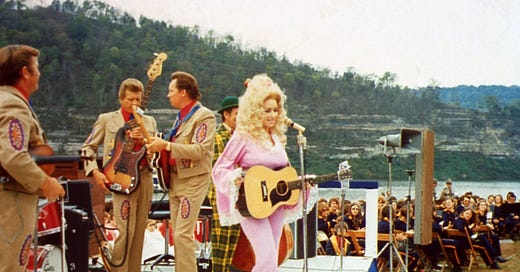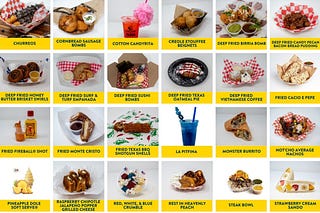

Discover more from Flashlight & A Biscuit
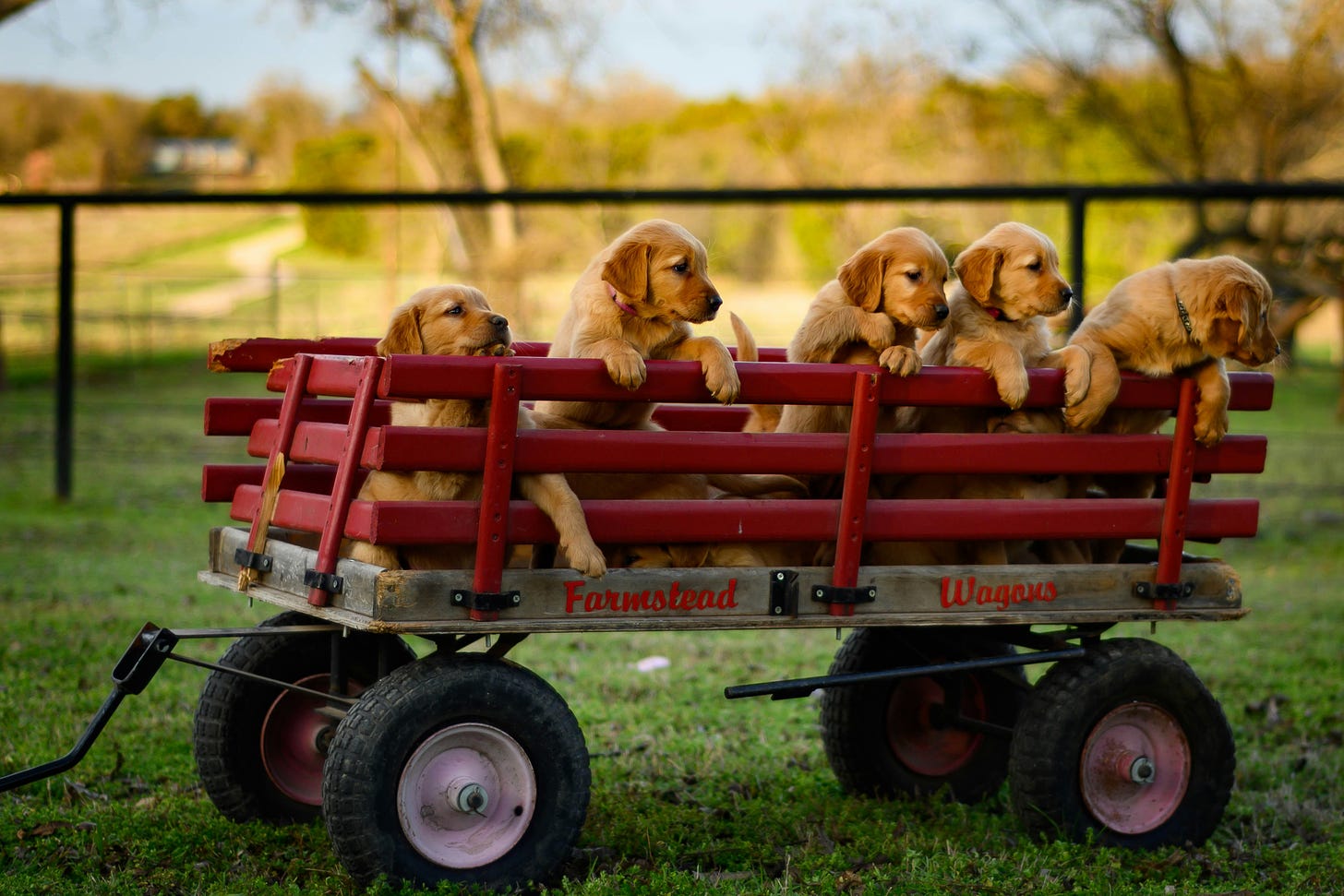
Welcome to Flashlight & A Biscuit, my Southern culture/sports/music/food offshoot of my work at Yahoo Sports. Thanks for reading, and if you’re new around here, why not subscribe? It’s free and all.
Certain books just make you happy even before you crack them open, and Tommy Tomlinson’s “Dogland: Passion, Glory and Lots of Slobber at the Westminster Dog Show” is one of them. Romping its way onto shelves on Tuesday, April 23, the book is charming, hilarious, heartbreaking, and ultimately joyful … you know, a lot like dogs themselves.
Tommy is one of the finest writers I know, and you should read both his book and his newsletter (and listen to his podcast). We had a fine little chat about the book, road trip music, and roadside restaurants, and you can sit in on it here. Ladies and gentlemen, Tommy Tomlinson:
JB: OK, Tommy, first. What is the best breed of dog, and why is it the beagle?
TT: Oh man, I hate to be in conflict with you right off the start. Actually, Jay, I think the best breed of dog is the mutt. Beagles are great, I love beagles. In fact, there’s hardly any breed of dog that I came away from this book not liking, although some clearly more than others. But I've always been a mutt guy.
The dog that my wife and I had for many years was a yellow lab, like a short-hair pointer or something. And every dog I ever grew up with or spent much time around was a mutt. I tend to think they take the best parts from everything, which purebred dogs aren't always able to do.
And so that's been my preference. It does sound weird. I've written this book about all purebreds, but if I had to choose, I'm just gonna go into the pound and pick out the best mix.
JB: Your dog Fred was the centerpiece of the book, and I’m not going to lie, that section just ripped me up. It was wonderful and yet heartbreaking, just the way that having a dog is. How is it, writing something like that? I lost my dog Hawkeye in the summer of 2020, and it still hurts. How is it for you, going back and remembering such a raw moment?
TT: I had written about him once or twice before. I'd done a piece for Charlotte magazine close to when it happened. He died in 2015. And I've been thinking about this a lot recently, because I'm doing some auxiliary pieces to the book, like why people grieve dogs and other pets sometimes so much harder than they grieve other humans in their lives.
Certainly for us, losing Fred for my wife and I was just a sledgehammer blow to our hearts. For most of the time that you have a pet, you have it for its entire life. We got to see Fred from the time he was a little puppy all the way, almost 15 years, to the end.
It also inverts sort of the natural order of things. As a “parent” — I put that in quote marks — as a “parent” you're used to the idea of, you will die before your children do. But when you have a pet, pretty much from the moment you get a pet, you're signed up to the idea that they're going to die before you do.
Then there's also the innocence of a pet. Loving a pet is mostly uncomplicated, compared to loving other human beings. Dogs generally don't betray you, they don't get in big fights with you. They don't do things that make you mad at them, and all that sort of thing.
So, it's a much less complicated relationship in many ways. What all that adds up to is that even though you might love another human being more in the moment, you might feel the love for that dog, and that's when the tears come out.
I don't want people to get the idea that this is a downer book! There's lots of fun stuff in it too. But that is certainly one part of it and it's something that people in this world have to deal with all the time. You have a dog and then you lose it. How do you deal with that?
JB: The overall makeup of the book is the Westminster Dog Show. You've covered all the, the biggest sporting events in the country. How does the spectacle of the Dog Show compare with an SEC championship or a Super Bowl?
TT: The first Westminster I went to was back in 2020, just before the pandemic started. It was the last one they had at Madison Square Garden, which was the traditional home of Westminster for more than 100 years. What I did not know, having just watched it on TV, was that at the event people get tanked! It’s a long day, and beer for sale, and it’s not all that different from an SEC football game or a NASCAR race. There’s lots of opportunities to drink and yell.
Right at the end, when they got down to the last seven dogs and were picking Best In Show, there was a golden retriever named Daniel. Retrievers have traditionally, until just recently, been the most popular breed in America. Golden retrievers have never won the Westminster Dog Show, and this one golden retriever named Daniel was clearly the crowd favorite.
And as he was going around the ring, people were cheering and screaming! As the other dogs were going around the ring, especially this one black poodle, people were booing! It was fascinating to me to hear that, because I didn't sense that from just watching it on TV.
And sure enough, when they announced Best In Show and the poodle won, there were pretty clear jeers from the audience. I thought that was pretty amazing.
The last couple of years they've done the show, it's been outdoors. The couple that I covered were at this big estate in upstate New York. It's kind of like the Biltmore House, and the vibe is much more muted there. But it's also this interesting mix of wealthy and ordinary people, sort of a real Great Gatsby vibe. But then there's also biker guy types in there too, because all types of people own these show dogs. That mix is something that I found to be really interesting.
JB: One of the things I really like about your work is the way that you find a telling anecdote, like you just did right there with the poodle and the golden. What’s a moment that still sticks with you now, all these months and years after finishing the book?
TT: I was at the National Dog Show, which is in suburban Philadelphia. That's the one that airs on Thanksgiving Day on NBC, right before football starts. It's in this giant vast convention center out in suburban Philly. I was sitting there one day, just taking notes. And I felt this weird sensation under my left arm. When you get a little older and you’re a guy and you feel the sensation in your left arm, you’re like, Oh my God, I’m having a heart attack.
But there was no pain. It was just weird. And I happened to look down, and where my arm had made a crook, there was a snout poking through the hole. I swung around real slow, and it was this gigantic English sheepdog that had poked a snout up under my arm.
One thing you learn when you go to these dog shows is that you’re not supposed to go around petting the dogs, because they’re all groomed to the Nth degree. And [handlers] don’t want you messing up their hair. So I looked at the handler and said, Is this OK? And the handler just said, yeah, just leave him here for a second.
“This big old dog just comes to put his chin on my lap, and it was like he was saying, It’s gonna be fine.”
She was texting on her phone, and he just poked his head up under my arm and laid his chin on my leg for, I don’t know, 30 seconds, just very still. And it was one of those beautiful moments that dogs bring you, when you feel like they understand what you’re going through.
I was in the middle of trying to cover all this stuff, and I didn’t know what I was doing yet. It was kind of frantic and I was anxious about how to make this book work. And this big old dog just comes to put his chin on my lap, and it was like he was saying, It’s gonna be fine. And after about 30 seconds, he pulled back and walked away and left this gigantic trail of slime on my pants leg. That moment, I’ll never forget that.
JB: The dogs are the focus, obviously, but there’s a whole array of judges, handlers, caretakers. What did you learn from them about why they do this? They're not getting rich. There's long hours. They're getting yelled at if they're a judge. What drives them to be around the dogs this much?
TT: That's a really good question because as you said, and I talk about in the book, this is not a big money business. The people who run the shows like the American Kennel Clubs and stuff like that, they certainly make some money off of it. Dog breeding is a business, certainly. But it's not like horse racing, where you can breed a horse for a million bucks.
The people who love it, love it for a lot of different reasons. Laura King is the main handler that I talked to in the book. She and her samoyed, Striker, are the main characters that take you through the book. She grew up in a dog-loving family. Her mom showed dogs. She literally learned to walk by holding onto her dog’s tail when she was little. And so that’s all she’s ever wanted to do is to have a life around dogs. And so she figured out how to do it, and the way she does it is by being a dog handler.
The handler is somebody who takes these dogs to shows, shows them around most of the time and at the highest level. The dog lives with the handler. The handler grooms it, feeds it, exercises it, takes care of it for whatever period they’re together. And she loves that experience of being with the dog and making that connection.
The people who own the dogs, who ship these dogs away to handlers for years at a time, it was a little harder for me to figure out the “why” there. Somebody said to me something that makes a lot of sense. They said it was like owning a really nice piece of art. It’s something that belongs only to you. It’s something you get to display to the world. And it’s a thing of beauty that is yours.
JB: Any time you’re trying to break into a cloistered and closed society when you’re a journalist, you’ve got to deal with people giving you the side-eye, people wondering what you’re doing, what your angle is. How did you win over the trust of not just the dogs but their handlers as well?
TT: It took a little while. I think people are generally interested in explaining their world to other people. Every subculture has its own rules, its own lingo, its own ways. And even though people are protective of it, they're also in it because they really enjoy it and love it and they enjoy explaining it to other people.
Even though I did some research on dog shows before I wandered in, when I first wandered in, I portrayed myself as somebody who knew nothing. And I would often say, explain this to me like I've never seen a dog show before. Often people were really good and then saying, OK, you don't know anything. Let me explain this stuff to you. And I learned a lot that way. In fact, it's a good way to learn things.
JB: Better life: retired show dog or retired college football coach?
TT: Well, the retired college football coach has a lot more money, but the retired college football coach also has mortgages, has in some cases several ex-wives, may have gambling debts. You know, they have all manner of hands reaching for those big settlements. The retired show dog gets to run around fields, doesn’t have to exercise as much anymore, gets fed well and loved on all day long. I mean, any dog’s life is pretty damn good, but most of the time, a retired show dog is the top of the heap.
The biggest decision every day is, Do I go out in the backyard if it’s nice? Where do I take my six-hour nap? That’s something that probably even Nick Saban doesn’t get to deal with yet.
JB: No show dog has been called to testify in front of Congress yet.
TT: That’s right.
JB: In Charlotte, you do the South Bound podcast, which is one of my favorites every week. You bring in a different individual from all over the South to give a perspective on the region. Here in 2024, we’re past all the magnolia cliches and all that nonsense. What makes the South unique right now?
TT: A couple of things. First of all, we are still struggling with the thing that the South has always struggled with, which is this duality that we have in this place. It is beautiful and welcoming and rich in culture, in food, in sports, in literature, in art. It’s the genesis of jazz, the blues, country music.
All this incredible American creation has come out of the South, while at the same time, some of the very worst of America has also come out of the South. Certainly the Confederacy and all its legacy, and it’s continuing to be racist, anti-women, anti-LGBTQ people, anti-public education, anti- all the things that I care about.
“That constant struggle in the South is exhausting and heartbreaking sometimes. But it’s where I want to be.”
And so we have to deal with the constant struggle of these two huge forces in our lives that mean totally different things, and who’s winning at the moment and who’s going to win in the long run. I think that one thing that is changing about the South is that a lot of the people who left the South for all those terrible reasons are coming back. You know, the great migration where so many Black Southerners left for the Midwest and the Northeast and West. These people have started to come back home, and have started to make their own home in a new type of South.
There are cities that are now enclaves for a different way of seeing the South, a more progressive way, and those ways are just as Southern, they mean just as much, as Jason Aldean, or whoever you want to name.
That constant struggle in the South is exhausting and heartbreaking sometimes. But it’s where I want to be. I want to be engaged in that battle. And when I talk to people, especially Black Southerners, about why they stay, this is what they talk about. They want to be the ones to be here when things change finally for the good. And that’s what I want to do too.
JB: There’s nothing that pisses me off more than when some Southerner shows their ass, and then someone up in Brooklyn says, Why don’t we just kick the South out completely? Or they use the Bugs Bunny GIF sawing Florida off. That’s not how change is made, that’s not how growth is made. You work at it, you stay with it, and you stay a part of it. I think that’s a huge part of what the South has to offer, is people who are staying here and people who are making the change that they want to see.
TT: It’s always been more complicated here than anybody would like to admit, including most Southerners, and yeah, I get pissed off too when I hear somebody from Brooklyn writing this all off. But I also understand where that comes from, right, because they’ve heard that same crap out of the South for their entire lives. They may have tuned out the other [good] stuff, though.
As you said, there’s so much more to it, and there’s so much worth saving and worth planting and growing. Our soil here is really, really fertile and grows incredible stuff, as long as we don’t walk by and pee on it on a regular basis. As long as we can leave it alone and let things grow, amazing things happen.
JB: You also have a newsletter, “The Writing Shed.” You always dedicate a slot to music. What’s the one song you’ll put on for the open road? It’s a summer afternoon, you’ve got nowhere to be, you’re just out on the road. What’s the song that sets the mood for you?
TT: The number one song that I often put on to start a road trip is “Jessica” by the Allman Brothers. That instrumental, which is what I think is the greatest piano solo ever recorded by Chuck Leavell, a tree farmer from middle Georgia — that song just is the open road to me. It sounds like a road trip. It sounds like you're flying down the highway and the road’s rushing by, and you're trying to catch up to the dream that's right out in front of you. That's what that whole song sounds like to me.
[It’s on our playlist now.]
JB: Down in Pine Mountain, Georgia, there's a little barbecue joint that I go to called Three Little Pigs Barbecue. And when I go there, I know that I'm home. I know that I'm safe. I know the entire menu. What is that place for you?
TT: There's a hot dog joint in my hometown of Brunswick, Georgia called Willie's Weenie Wagon. The sign has a little quote under it saying “We relish your bun.” That place has been open since I was a little kid, since the late Sixties, early Seventies. And that was where in my hometown, if you wanted to find somebody, you went there and you just parked your car, and eventually, on a Friday night, they would come by. I know the whole menu, although I tend to get the same thing every time: a slaw and cheese dog and a sweet tea.
When I go home, I will sometimes go there and not even get anything. And I'll just park my car and sit down on the hood and watch people go by. Even though I haven't lived there in 40 years, somebody I know will inevitably come by and we'll talk and say hey. That's my spot.
JB: The book is “Dogland.” It is wonderful. Get it when it comes out April 23rd.
TT. Thank you so much, my friend.
JB: It's been tremendous. Let's hang out and watch a Dawgs game soon.
TT: Good deal, Jay.
Buy the book, and if you’re anywhere near Tommy when he’s touring, visit him in person. This is a fantastic book, and you’ll enjoy every page.
That’ll do it for this time around, friends. Enjoy the weekend, and we’ll catch you right back here next week. You’re all good boys and girls.
—Jay
Land Cat, Georgia
This is issue #119 of Flashlight & A Biscuit. Check out all the past issues right here. Feel free to email me with your thoughts, tips and advice. If you’re new around here, jump right to our most-read stories, or check out some of our recent hits:
Our first documentary, on the famous Rama Jama’s diner in Tuscaloosa, Alabama:
Y’all want some hockey?
The Black Crowes and the groove vs. the rut
All hail the Luther Burger
“Until I see God or the checkered flag”: The greatest NASCAR quote of the decade
What does “Flashlight & A Biscuit” mean, anyway?
Keep in touch with me via email right here. And load up a to-go box before you leave:
If you dig this newsletter, share it with your friends. Invite others to the party, everyone’s welcome.
Subscribe to Flashlight & A Biscuit
Kick back with some tales of Southern culture, sports, food and music from Jay Busbee. Grill's already hot; drinks are on ice. Pull up a chair.






